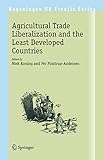Agricultural trade liberalization and the least developed countries / edited by Niek Koning and Per Pinstrup-Andersen.
Material type: TextSeries: Wageningen UR frontis series: v. 19.Publisher: Dortrecht, Netherlands : Springer, c2007Description: 249 p. : ill. ; 24 cmISBN: 1402060858 (pbk.); 9781402060854 (pbk.); 9781402060793; 1402060793Subject(s): Produce trade -- Government policy -- Developing countries
TextSeries: Wageningen UR frontis series: v. 19.Publisher: Dortrecht, Netherlands : Springer, c2007Description: 249 p. : ill. ; 24 cmISBN: 1402060858 (pbk.); 9781402060854 (pbk.); 9781402060793; 1402060793Subject(s): Produce trade -- Government policy -- Developing countries| Item type | Current location | Call number | Status | Date due | Barcode |
|---|---|---|---|---|---|
 Reference
Reference
|
GKVK Library | 382.41 KON (Browse shelf) | Not for loan (Restricted Access) | 134637 |
Includes bibliographical references.
1. Agricultural trade liberalization and the least-developed countries: introduction / N. Koning and P. Pinstrup-Andersen -- 2. Agricultural trade, development problems and poverty in the least-developed countries: an overview / O. �Ostensson -- 3. Making agricultural trade reform work for the poor / M.A. Tutwiler and M. Straub -- 4. Price intervention in Sub-Saharan African agriculture: can an institutionalist view alter our conception of the costs and benefits? / A. Dorward, J. Kydd and C. Poulton -- 5. Poverty, land conservation and intergenerational equity: will the least-developed countries benefit from agricultural trade liberalization? / K. Savadogo -- 6. Trade liberalization in cotton and sugar: impacts on developing countries / A.M. Nassar -- 7. How to increase the benefits of the DOHA development round for the least-developed countries / D. Blandford --8. Improving market access in agriculture for the African least-developed countries: deepening, widening, broadening and strengthening trade preferences / W. Yu -- 9. Agricultural trade liberalization under Doha: the risks facing African countries / O. Badiane -- 10. The practical experience with agricultural trade liberalization in Asia / D. Dawe -- 11. What can be learned from the history of developed countries? / N. Koning -- 12. How U.S. farm policies in the mid-1990s affected international crop prices: a harbinger of what to expect with further world-wide implementation of WTO-compliant policy modifications? / D.E. Ray and H.D. Schaffer -- 13. The WTO agricultural negotiations and the least developed countries: limitations and options / S. Murphy.
Will poor countries benefit from agricultural trade liberalization? This question is of great importance now that efforts are being made to revamp the Doha Round and negotiations on European Partnership Agreements are entering their final phase. The Doha round was called a Development Round, but little was accomplished before the negotiations stalled in mid-2006. The assumption was that developing countries would gain from trade liberalization in agricultural commodities, but whether this is true for the 50 least developed countries (LDCs) remains hotly debated. Will gains from liberalization offset the erosion of the preferential access that LDCs currently have to OECD markets? Or will such gains be captured by middle-income countries with strong export potential in agriculture? Are LDC interests well represented by the Group of 21, which consist primarily of middle-income countries? How can LDCs respond to the continuation of trade-distorting policies of OECD countries? In this book, several experts on international trade and development address these and related questions.

There are no comments on this title.